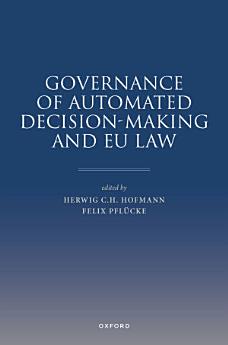Governance of Automated Decision-Making and EU Law
Aug 2024 · Oxford University Press
Ebook
352
Pages
family_home
Eligible
info
reportRatings and reviews aren’t verified Learn More
About this ebook
Governance of Automated Decision-Making and EU Law presents a comprehensive and nuanced exploration of the intricate relationship between technological innovation and democratic governance in Europe. Focused on preserving constitutional values within the European Union, the book rigorously examines the profound impact of information technologies on rule-making and decision-making processes. The dual objectives of the volume are to comprehensively explore the impact of innovative information technologies on the EU's public law and to devise future-proof regulatory strategies in the face of rapid technological advancements. Addressing the spread of information technology and automated decision-making processes across EU policy sectors, the work delves into potential risks to democratic principles and accountability standards. Advocating for a comprehensive approach, the volume integrates legal, policy, and technological considerations to establish accountability standards for automated decision-making systems. Tailored for academics, researchers, and policymakers, Governance of Automated Decision-Making and EU Law provides a vital resource for understanding the complexities and opportunities associated with the digitalization of shared administration in the EU. It contributes significantly to the ongoing discourse on safeguarding constitutional values and principles of good governance in the digital era. The findings underscore the interconnectedness of information systems across EU-regulated policy areas and the risks posed by automated decision-making systems. Urging attention to transparency and accountability, the book addresses these concerns through eleven chapters, offering insights into normative requirements, administrative procedures, market regulation, digital health, borders and immigration, political advertising, interoperability framework, AI technology, and their intersection with legal principles. This is an open-access title available under the terms of a CC BY-NC-ND 4.0 International license.
About the author
Herwig C.H. Hofmann is Professor of European and Transnational Public Law in the Faculty of Law, Economics, and Finance at the University of Luxembourg. His teaching and research focuses on European constitutional, administrative, and regulatory law, as well as international trade and comparative public law. He was previously a member of the faculty of the School of Law, Trinity College, Dublin. Felix Pflücke is a Postdoctoral Researcher at the ADA Chair in Financial Law at the University of Luxembourg. He is also a Lecturer in Law at Somerville College, University of Oxford. He was previously a Lecturer in Law at Queen's College and a Doctoral Researcher at Brasenose College and the Faculty of Law, University of Oxford. He was also a Guest Lecturer in Law and Technology (M2/LL.M.) at Université Paris 1 Panthéon-Sorbonne, a Research Assistant to Dr Geneviève Helleringer and Professor Horst Eidenmüller, an Associate Editor at the Oxford Business Law Blog, and a visiting researcher at the Max Planck Institute for Comparative and International Private Law.
Rate this ebook
Tell us what you think.
Reading information
Smartphones and tablets
Install the Google Play Books app for Android and iPad/iPhone. It syncs automatically with your account and allows you to read online or offline wherever you are.
Laptops and computers
You can listen to audiobooks purchased on Google Play using your computer's web browser.
eReaders and other devices
To read on e-ink devices like Kobo eReaders, you'll need to download a file and transfer it to your device. Follow the detailed Help Center instructions to transfer the files to supported eReaders.







